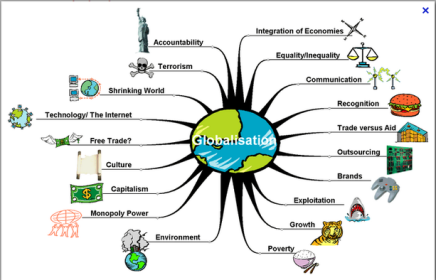What is globalisation and what effects does it have on a macro scale? As stated from O’Shaughnessy, globalisation is referred to as an international community influenced by technological development and economic, political and military interests (O’Shaughnessy and Stadler, 458). It is seen to be the influence and emergence of westernised cultural values and norms throughout non-westernised countries. Although when we predominantly focus on the effects it has had on a macro/ international scale, distinguished utopian and dystopian views are identified.
 The overall process of globalisation has created two dissimilar views. The utopian perspective can be identified as aiming for a state in which everything is perfect.This perspective is the idealistic view. This idealistic view believes that globalisation is positive as it increases unity among individuals and cultures on a international. This viewpoint can be identified throughMarshall McLuhan’s phrase, ‘The global village’. O’Shaughnessy and Stadler identify the ‘global village’ as ” An image of a world in which media transcend the national state in a democratising process that gives everyones voice a chance to be heard and enables information to freely shared.”(O’Shaughnessy and Stadler, 459).
The overall process of globalisation has created two dissimilar views. The utopian perspective can be identified as aiming for a state in which everything is perfect.This perspective is the idealistic view. This idealistic view believes that globalisation is positive as it increases unity among individuals and cultures on a international. This viewpoint can be identified throughMarshall McLuhan’s phrase, ‘The global village’. O’Shaughnessy and Stadler identify the ‘global village’ as ” An image of a world in which media transcend the national state in a democratising process that gives everyones voice a chance to be heard and enables information to freely shared.”(O’Shaughnessy and Stadler, 459).
Through modern examples of globalisation such as technology manyindividuals attracttowards the utopian view of globalisation, as they believe globalisation has a positive impact on a international scale increasing unity among individuals and cultures around the world. O’Shaughnessy and Stadler explore a significant example of the utopian perspective through the media coverage of the earthquake and tsunami in Japan in 2011. This event prompt several individuals around the world to donate money to help the victims and prompted the government to provide personnel to aid and assist Japan through this horrifying world disaster. This event was bought to attention through the media coverage of the disaster. The utopian perspective explores how globalisation can create and distinguish positive changes connecting cultures and creating awareness.
The opposite viewpoint, the dystopian perspective focuses on the negative effects in which globalisation is creating. Dystopian views are concerned with the influences globalisation is creating such as mass production. A example of this can be identified though cultural imperialism which is a distinguished dystopian view that` has been shaped throughout the process of globalisation. How one culture shapes and spreads its cultural values and ideas is identified as cultural imperialism. Although O’Shaughnessy and Stadler define cultural imperialism as “imperial domination of of the world maintained partly through the dissemination of cultural products.” They also argue that “globalisation of communication results in the domination of traditional cultures and the intrusion of western culture and values such as consumerism.”(O’Shaughnessy and Stadler, 465).
A example of this can be seen through the global phenomena of Nike. Cultural imperialism is specifically highlighted through the American sports values and products being imposed and having significant influence over the existing Chinese culture. The international brand,Nike distinguishes cultural imperialism through their subliminal advertising of the Nike brand. Through their targeted marketing approach utilising famous Chinese famous athletic as their sponsors it creates a want and desire among the Chinese community who aspire to emulate their Chinese heres and aspire to live and follow the american dream.However this comes at a cost to the Chinese community altering and influencing their cultural mentality and values depicting cultural imperialism.

Although where is it going to end? Are we going to become a hegemonized global village?
BCM111- Week 2
Zo xo
Sources:
- O’Shaughnessy, M 2012, ‘Globalisation’ in Media and Society, 5th ed, Oxford University Press, South Melbourne, Vic. pp.458-471.
- Nike case study, Imperialism Today – Weebly, weblog post, viewed 4 August 2017,<http://nike-cultural-imperialism.weebly.com/nike—case-study.html>